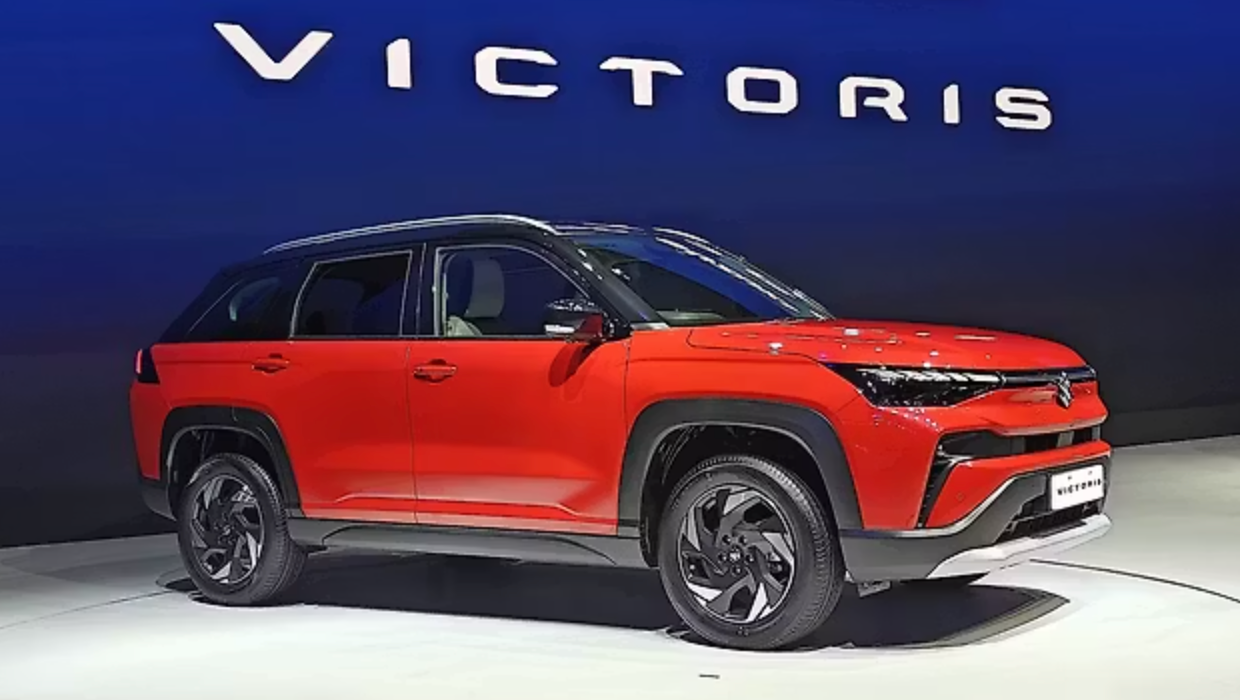India’s electric vehicle (EV) market is buzzing with anticipation, and leading the charge is Maruti Suzuki’s inaugural all-electric SUV, the e Vitara. Initially slated for a March 2025 release, the launch has now been postponed to September 2025. Despite the delay, the e Vitara is already making appearances at dealerships nationwide, with some accepting offline bookings.

Maruti e Vitara: A Comprehensive Overview
Sleek Exterior Design
The e Vitara boasts a contemporary design featuring LED projector headlights, Y-shaped LED daytime running lights (DRLs), and aerodynamically optimized 18-inch dual-tone alloy wheels. The rear is accentuated by wraparound LED tail lights connected by a gloss black trim, enhancing its modern appeal.
Premium Interior Features
Inside, the e Vitara offers a dual-tone black and tan interior with a layered dashboard design. Key features include a floating 10.25-inch touchscreen infotainment system, a 10.1-inch digital driver’s display, and a two-spoke steering wheel. The seats are upholstered in semi-leatherette material, complementing the overall cabin aesthetics.
Additional amenities encompass a fixed glass roof, an Infinity sound system, ventilated front seats, a 10-way electrically adjustable driver’s seat, ambient lighting, and a PM2.5 cabin air filter.
Advanced Safety and Technology
Safety is paramount in the e Vitara, which comes equipped with up to seven airbags, a 360-degree camera, electronic parking brake, tyre pressure monitoring system (TPMS), and front and rear parking sensors. Notably, it marks Maruti Suzuki’s first vehicle to feature Level-2 Advanced Driver Assistance Systems (ADAS), including adaptive cruise control and lane keep assist.
Powertrain Options and Performance
The Maruti e Vitara will be available with two battery pack options, both paired with a front-mounted electric motor:
| Battery Pack | Power Output | Torque | Estimated Range | Drivetrain |
|---|---|---|---|---|
| 49 kWh | 144 PS | 192.5 Nm | ~400 km | Front-Wheel Drive |
| 61 kWh | 174 PS | 192.5 Nm | Over 500 km | Front-Wheel Drive |
Note: An all-wheel-drive (AWD) variant with a dual-motor setup is available in international markets but is not confirmed for India.
Expected Pricing and Market Rivals
The e Vitara is anticipated to be priced between ₹17 lakh and ₹22.50 lakh (ex-showroom), positioning it competitively within the electric SUV segment.
-
Hyundai Creta Electric: ₹17.99 lakh – ₹24.38 lakh
-
Tata Curvv EV: ₹17.49 lakh – ₹21.99 lakh
-
Mahindra BE 6: ₹18.90 lakh – ₹26.90 lakh
-
MG ZS EV: ₹18.98 lakh – ₹26.64 lakh
Final Thoughts
While the delay in the e Vitara’s launch may be disappointing for eager customers, the SUV’s promising features, advanced safety systems, and competitive pricing make it a noteworthy contender in India’s growing EV market. As Maruti Suzuki’s first electric offering, the e Vitara is poised to make a significant impact upon its release in September 2025.
Frequently Asked Questions:
Q1: When is the Maruti e Vitara expected to launch in India?
A1: The Maruti e Vitara is now scheduled for launch in September 2025, following delays from its initial March 2025 timeline.
Q2: What are the battery options available for the e Vitara?
A2: The e Vitara will offer two battery packs: a 49 kWh option with an estimated range of ~400 km and a 61 kWh option with a range exceeding 500 km.
Q3: What safety features does the e Vitara include?
A3: Safety features include up to seven airbags, a 360-degree camera, electronic parking brake, TPMS, parking sensors, and Level-2 ADAS with adaptive cruise control and lane keep assist.
Q4: What is the expected price range of the e Vitara?
A4: The e Vitara is expected to be priced between ₹17 lakh and ₹22.50 lakh (ex-showroom).
Q5: Who are the main competitors of the e Vitara in the Indian market?
A5: Key competitors include the Hyundai Creta Electric, Tata Curvv EV, Mahindra BE 6, and MG ZS EV.




